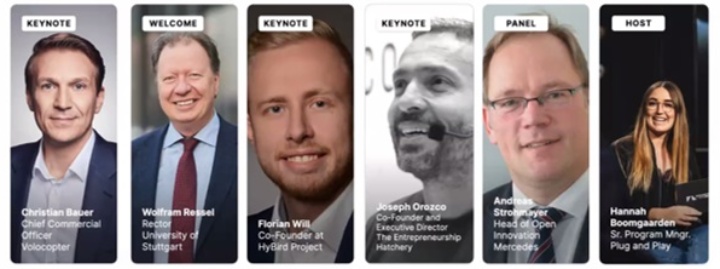Speaker Series:
Experienced startup founders, current startup teams from the University of Stuttgart as well as supporters from the start-up ecosystem report on their experiences as part of the Speaker Series and give some useful suggestions. This time, the joint format of STARTUP AUTOBAHN powered by Plug and Play, ARENA 2036 and the University of Stuttgart had the motto “From the idea to a successful startup”.
After a greeting from Rector of the University of Stuttgart Wolfram Ressel, startup founder Christian Bauer spoke about his experiences with Volocopter at the event held on February 11. It all started with a toy drone and the question: “Why isn’t it possible to lift a person up in this way?” Then came the first steps in the process, people were sought and found to work on the project, design studies were drawn up, experiments were carried out and prototypes tested. After a long journey, the company now operates worldwide.

Bauer’s tip is to “fail fast”, so that startups don’t lose sight of their market and their target group. In the case of Volocopter, Bauer says that another important step was inviting an expert onto the team at the right time who was able to set the startup on course for growth. He went on to say that the four fields of Strategy, Execution, Cash and People were central pillars for startups on their path to success.
Corona crisis: challenges for startup teams
As is the norm in this format we then heard from a representative of a startup team, in this case a team which is still in the early stages. Florian Will reported on the challenges and problems with respect to the corona crisis, for example in the case of the HyBird project [de]. He said that building a network of relevant contacts was a challenge for startup teams which were still at university or coming to the end of their university studies in particular. His advice to the startup teams was to build a network, find the relevant people you need and not to forget: “You miss 100% of the shots you don't take“, a quote by former Canadian ice hockey player Wayne Gretzky.
Three questions which startups need to answer
“Why me? Why now? Why this?” - Startups first need to be able to answer these three questions, says Joseph Orozco, co-founder and Executive Director of the Entrepreneurship Hatchery at the University of Toronto. As the third participant in the Speaker Series panel, he gave some insights into his perspectives of the world of entrepreneurship. He firmly believes that: “Students shouldn’t just leave university with a degree, but where possible with a job that they’ve created themselves”.
Students shouldn’t just leave university with a degree, but where possible with a job that they’ve created themselves.
Joseph Orozco, Co-founder and Executive Director of Entrepreneurship Hatchery der University of Toronto
During the panel moderated by Andreas Strohmeier, who as the Head of the Department of Aircraft Design at the University of Stuttgart’s Institute of Aircraft Design is an expert in the field of “air mobility”, participants could put their questions to those on the panel via chat. Joseph Orozco and others answered a question about what makes a good entrepreneur or a successful startup with the advice “Open your eyes” and “Recognize opportunities and react to them”. He also spoke of the relevance of multi-disciplinarity. His specific advice was: “Always include people from other subject areas.”

